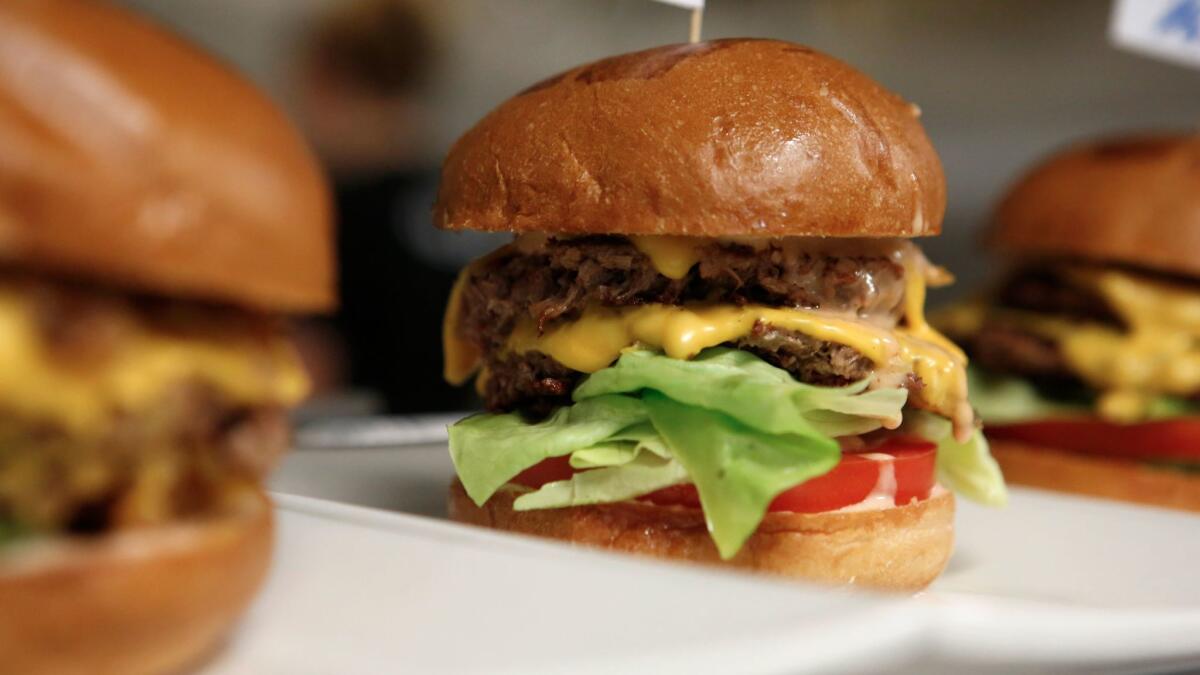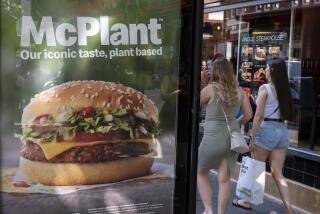Impossible Burger could be sold in stores after FDA approves coloring

- Share via
The Impossible Burger, so far only available at restaurants, could finally be making its way to U.S. grocery store shelves, giving chief rival Beyond Meat Inc. a new competitor inside retail. Its maker also announced on Wednesday plans to produce more of the meat-free patties through a new collaboration.
In response to a petition submitted by Impossible Foods, the Silicon Valley maker of the eponymous burger, the U.S. Food and Drug Administration has amended its rules to call the use of soy leghemoglobin safe as a color additive in imitation beef, clearing a key hurdle in the company’s push to sell raw product inside grocery stores.
The rule change is effective Sept. 4, though petitioners still have a chance to file objections.
Separately, the company said it had signed a deal with global food producer OSI Group to expand production. OSI will begin making the Impossible Burger starting this month, adding short-term capacity to Impossible’s own Oakland factory.
“OSI has already installed equipment to make the Impossible Burger, and we’ll start seeing new capacity every week,” Impossible’s senior vice president of product and operations, Sheetal Shah, said in the statement.
The production announcement comes after a months-long shortage of the popular soy-based beef replacement. Impossible Foods recently moved to three eight-hour shifts from two 12-hour shifts in July.
Soy leghemoglobin, or “heme,” is the ingredient that gives the Impossible Burger its essential meat-like flavor, along with a red hue. But it hadn’t been formally approved as a safe color additive, meaning retailers couldn’t sell it raw as they can raw Beyond Meat patties.
That meant Impossible Foods has been limited to selling inside restaurants. It’s offered at large restaurant chains Red Robin and White Castle, and it has signed a deal to be sold in all 7,300 Burger Kings nationwide by the end of the year.
“We are in the midst of a revolution in food technology that in the next 10 years will likely lead to more innovations in food and ingredient production than there have been in the past half century,” said Dennis Keefe, director of the Office of Food Additive Safety in the FDA’s Center for Food Safety and Applied Nutrition. “As these new products and ingredient sources come to the market, the FDA has a responsibility to provide the appropriate regulatory oversight to protect public health by ensuring that these new foods and food ingredients are safe.”
One indication of the boom in meat-free patties is the stratospheric rise in the stock price of Beyond Meat. Shares of the El Segundo company have jumped more than 700% since their May 1 debut, and closed up 0.9% to $196.51 on Wednesday.
That precipitous jump has generated intense interest among short sellers, who borrow shares on the bet that they can be paid back with cheaper shares after the price plunges. Almost 45% of the Beyond Meat shares that were in the hands of public investors as of July 30 were borrowed for short selling, according to data from financial analytics firm S3 Partners. As supply of the shares dwindles, it’s made the stock the most expensive short bet.
More to Read
Inside the business of entertainment
The Wide Shot brings you news, analysis and insights on everything from streaming wars to production — and what it all means for the future.
You may occasionally receive promotional content from the Los Angeles Times.










